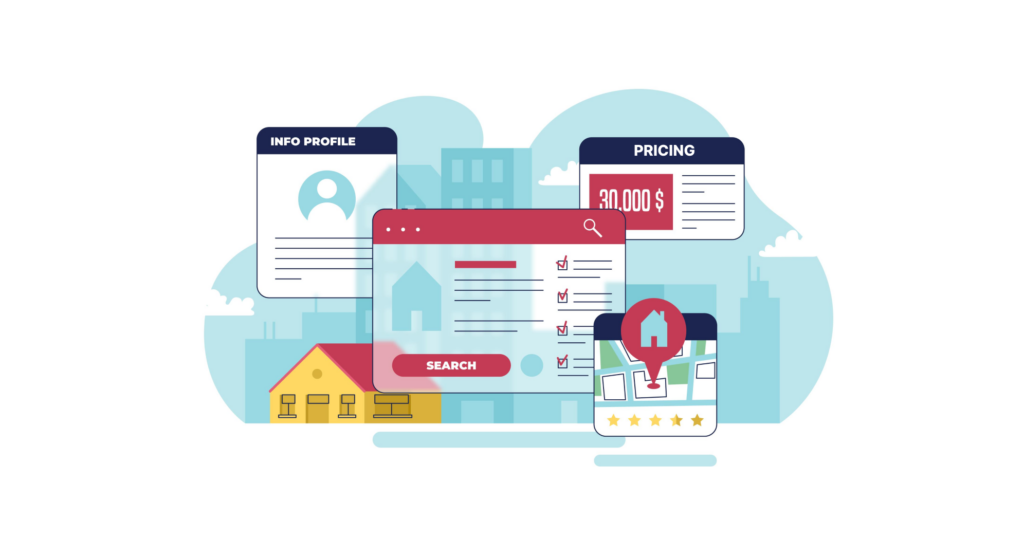CRM in Real Estate: Manage Leads and Close Deals Faster

Table of Contents
CRM, or customer relationship management, is a system that helps companies keep track of their contacts with both existing and new clients.
It facilitates the development and maintenance of solid connections by automating difficult processes, tracking leads, and organizing client profiles.
The CRM system is particularly made to streamline operations and enhance customer service in order to satisfy the demands of agents and real estate businesses.
But what is a CRM in real estate? It's a technology that helps real estate brokers manage their business better, to put it simply.
Every aspect of the customer journey are placed into perspective by CRM in real estate, from recording client questions to monitoring deal progress. It makes sure agents can prepare, react fast, and give their clients a customized experience.
The CRM, for example, saves the profile and preferences of a prospective buyer when they show interest in a home, enabling operators to recommend suitable listings.
In order to make sure that no opportunity is missed, it automatically follows up and reminds staff of important duties.
Improved communication, data management, and streamlined teamwork make CRM a potent tool that provides outstanding customer service and effectively closes business.
Understanding What is a CRM in Real Estate?
When using a CRM (customer relationship management) system, real estate agents may find it easier to maintain organization and build long-lasting connections with clients.
By centralizing all client data, including contact details, preferences, and transaction history, CRM helps agents remain on top of critical duties and swiftly obtain the information they require.
By using the system, agents may simplify the process of managing leads and eliminate the need to follow up with potential buyers or inspect property specifics.
Communication and productivity are significantly enhanced with CRM. Agents can react promptly and never miss a crucial discussion since it maintains all communications—whether by text, phone, or email—consolidated.
To save time and lower the likelihood of missing important work, CRMs can use automated features to remind staff members of meetings or assignments.
Together, the CRM makes sure that everyone is in agreement and has access to the most recent data, facilitating quicker and more effective staff collaboration.
CRM in real estate is really about simplifying the entire process for agents and clients, not simply about maintaining data.
It enables agents to negotiate, provide individualized service, and cultivate enduring relationships—all of which are critical for success in the quick-paced real estate industry.
Have you ever wondered how CRM may change your company and what it actually is? Let's explore CRM in detail, including its many forms, integrations, and AI's potential. All set to realize its greatest potential? Now start exploring!
Key Features of Real Estate CRM

A number of important elements included in real estate CRM make it more simpler for agents to handle client interactions and relationships.
- Contact management is one of the important features; it allows agents to store and organize client information in a single central spot, making it easier to track contacts and preferences This guarantees that agents have immediate access to critical information whenever they require it.
- Lead management is another important feature, helping agents attract, follow up and prioritize potential clients from initial inquiry to closing. Gradual leads based on auto-engagement help CRM professionals focus on the most promising opportunities.
- Marketing automation is also important in today’s competitive marketplace. A CRM can automate email campaigns, social media posts and other marketing efforts, saving representatives time as customers engage and report relevant properties.
- Sales pipeline tracking gives agents a clear idea of where each customer is in the buying and selling process. This helps keep everything in order and ensures that agents can take actions in a timely manner to move the deal forward.
- Report and analysis sections give useful information on the industry, lead conversion rate, and market trends. Managers may use this data to adjust their tactics, increase efficiency, and achieve greater outcomes in the future.
Benefits of Implementing a CRM System
Using a CRM system in the real estate business has various advantages, including the potential to greatly enhance production.
- First and foremost, this individualized approach helps to improve customer relationships by providing representatives with a more thorough understanding of customer preferences, transaction history, and interactions. This ensures that employees can provide commissioned services on a daily basis, respond promptly, and maintain communication, all of which increase customer loyalty and trust.
- CRM increases productivity and efficiency by handling repetitive tasks like appointment scheduling, reminders, and even following instructions. This relieves employees of manual labor, allowing them to concentrate on what really matters—creating relationships and closing deals.
- Increasing data integration and accessibility is one of a CRM system's most beneficial features. Instead of wasting time looking for emails or papers, agents may easily obtain the data they want because all client information, transactions, and transaction histories are kept in one location. This facilitates quicker decision-making and more effective communication.
- After all, putting a CRM into place aids companies in developing better marketing strategies. Agents may target specific audiences with pertinent listings and marketing campaigns by utilizing technologies that divide up clients into groups according to their interests, geography, and habits. CRM solutions assist companies in streamlining their operations, boosting engagement, and enhancing leader conversion rates through data-driven insights.
Cost Considerations for Real Estate CRM
Understanding pricing structure is important when thinking about a Real estate CRM so that you may base your choices on your company's requirements.
CRM systems often provide one-time purchases and subscription-based pricing options.
You pay a recurring cost, either monthly or yearly, when using a subscription-based approach. These options usually include cloud-based access, customer support, and frequent upgrades, enabling you to expand with your company.
However, a one-time purchase has a large upfront cost that is rarely paid. You could have to pay more for upgrades in the future, though, and this could lead to limits on support and updates.
Many variables, including the functionality you want, might affect a CRM's price.
Systems that are comprehensive and include sophisticated features like sales monitoring, marketing automation, and reporting are costly.
Scalability is another important factor to take into account. If you want a CRM that can expand with your team or company, you should budget extra for a system that allows for many users, data storage, and connection.
Additional expenses to take into account include training, team optimization, and incorporating new technologies like MLS (multi listing service) systems or email marketing platforms.
It is crucial to balance your budget, resources, and scalability when thinking about CRM methods.

Choosing the Right CRM for Your Business
For your real estate company, selecting the best CRM is important in increasing client satisfaction and streamlining processes.
It is crucial to concentrate on a few key elements that will genuinely help your team in order to make the ideal choice.
To begin, search for a CRM that has lead management capabilities that can help in capturing, monitoring, and prioritizing leads. This guarantees that you will be able to follow up with more leads and turn them into clients.
Another crucial function is Contact management, which enables you to compile and keep client data in one location for convenient access and updating as needed.
Your team's size and the system's usability should be taken into account when choosing a CRM solution. A CRM may expand with your company since it is scalable and easy to use.
Make sure the solution you select has the analytics and reporting data you need to track results and gradually enhance your sales tactics.
Integration with other tools and platforms is another crucial factor. You should have little trouble integrating your CRM with other programs you already use, such as calendar applications, list services, and email marketing platforms.
This easy integration guarantees that all of your instruments operate together flawlessly and helps to minimize human effort. The perfect CRM isn’t just a tool; it’s your business’s secret weapon.
It empowers you to deliver exceptional customer service, streamline operations, and supercharge productivity—all while remaining intuitive, adaptable, and ready to grow alongside your ambitions.
Having trouble keeping your real estate efforts on schedule? Learn how to improve productivity, promote success, and simplify your workflow with the help of the best project management software. All set to change your projects? Explore now!
Best Practices for Using CRM in Real Estate
Following certain best practices can help you get the most of your CRM in real estate by making sure your system is functional and efficient.
One of the most crucial things to do is to Maintain data integrity. Your CRM remains accurate and tidy when you routinely update client data to eliminate duplicate or out-of-date information.
By doing this, you can prevent misunderstandings, make sure you're constantly dealing with the most recent data, and enhance client communication.
For users, regular training and updates are crucial. Both CRM products and the real estate sector are expanding.
To make sure the system is being deployed successfully, your team receives ongoing training on new features, upgrades, and best practices.
Everyone benefits from regular training by becoming more used to and consistent with their equipment.
Last but not least, tailoring a CRM to your company's requirements will significantly impact its efficacy.
Adjust the structure to fit your unique process, whether it is automating particular follow-up procedures or constructing new fields for various files.
A CRM that is tailored to your business procedures is significantly more useful than one that is generic.
You can guarantee that your system will continue to efficiently assist your real estate company by keeping your data clean, educating your staff, and tailoring the CRM to your requirements.

Future Trends in Real Estate CRM
Using innovative technology to boost efficiency and enhance customer satisfaction is part of the future of real estate CRM.
A major trend that is altering the way real estate agents operate is the combination of automation and artificial intelligence.
The complexity of AI-powered CRM systems is growing, allowing for more individualized customer interactions and smarter lead management.
CRMs may use AI to monitor customer interactions, preferences, and behaviors to determine which prospects are most likely to convert. This helps staff better prioritize their work and communicate with AI.
Another significant development is the improvement of automation. Business planning, follow-up reminders, and automated email marketing campaigns make sure that no client or company is overlooked.
Without requiring more human labor, automation enables agents to develop dependable, effective procedures that enhance client interactions.
The way CRMs are utilized in the real estate industry is expected to evolve as a result of these advancements in AI and automation, which will make them more effective instruments for boosting output and providing more individualized service.
Conclusion
Real estate agents may benefit greatly from a CRM system, which offers an organized method of handling customer interactions, evaluating leads, and optimizing processes.
It is impossible to overestimate the significance of CRM in real estate industry; as a result, it facilitates staff organization, enhances communication, boosts output, and improves client satisfaction overall. enhances efficacy.
Agents may concentrate more on establishing connections and closing transactions by utilizing CRM tools like lead management, marketing automation, and sales monitoring rather than completing administrative duties.
Automation and artificial intelligence (AI) hold promise for CRM in real estate sector as it develops further, opening up new avenues for efficiency gains and more individualized service delivery.
When used properly, CRM can be a very effective tool that helps businesses expand and succeed in a market that is becoming more and more competitive.



